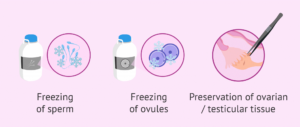Fertility Preservation for Cancer Patients in India
Dr. Hrishikesh Pai , a renowned fertility specialist in India, is one of the most preferred doctors for fertility preservation for cancer patients in India.
He is one of the pioneers in oocyte freezing, embryo freezing, and ovarian tissue freezing in India. He is the Founder and Medical Director of Bloom IVF group which is a chain of ivf centres in India.
Fertility preservation plays a vital role in improving the quality of life of cancer survivors. Modern cancer treatments such as chemotherapy and radiation effectively destroy cancer cells, but they can also damage the ovaries and testicles, leading to infertility.
Many young cancer survivors want to have children in the future, and the psychological impact of infertility can affect them adversely. However, fertility preservations through advanced Assisted Reproductive Technology (ART) can increase their chances of future pregnancy.
The most common cancers for which we do fertility preservation for cancer patients in India are breast cancer, borderline ovarian tumors, Hodgkin’s lymphoma, and non-Hodgkin lymphoma.
When is the right time to undergo fertility preservation?
It would help if you discussed with your doctor and the fertility specialist about preserving your fertility before cancer surgery happens or before the treatments begin.
Time is very crucial in cancer treatment. You will have to discuss with your oncologist whether you can delay cancer treatment to take fertility preservation steps and how this might affect your cancer.
We recommend oocyte freezing if you have around 2 to 3 weeks before starting chemotherapy.
But if you immediately have to start cancer therapy, then we can do ovarian tissue freezing.
CONTACT US FOR MORE INFORMATION OR BOOK AN APPOINTMENT
Types of fertility preservation for cancer patients:
- Fertility preservations for women with cancer: Several fertility preservation for cancer patients in India options are available for women and young girls who are about to start their cancer treatment.
- Embryo Cryopreservation: This process involves collecting the mature eggs, fertilizing them, and then freezing them for later use. Afterward, when the cancer treatment is over and the woman is ready to conceive, the embryo is thawed and implanted in the uterus. Embryo cryopreservation process can take up to several days or weeks as it depends on the woman’s menstrual cycle.
- Oocyte Cryopreservation (egg freezing): During this process, we remove the woman’s mature eggs and freeze the unfertilized eggs. Later, when the woman wants to become pregnant, the eggs are thawed, fertilized with the partner’s sperm, and implanted in her uterus. Egg freezing is an option for unmarried women.
- Ovarian Tissue Freezing: In this procedure, one of your ovaries is surgically removed. The tissue containing your eggs is separated from the rest of the ovary, frozen, and stored for future use. After cancer treatment, this ovarian tissue will be transplanted in your body so that the eggs in the tissue may grow and mature. We do this procedure for young girls before puberty who do not have mature eggs. Also, it is done for women who cannot delay their cancer treatment.
Fertility preservations for men with cancer: There are fertility preservation options available for men and young boys about to start their cancer treatment.
- Sperm Cryopreservation: In this process, we freeze and store the sperm for later use. Sperms can be frozen for years at our fertility clinic.
- Testicular Tissue Cryopreservation: It is a fertility preservation option for boys who have not gone through puberty, so semen cryopreservation is not possible. During this process, we remove tissue that contains cells that make sperm from the testicles through a small incision. It is then frozen and stored. Afterward, the tissue can be thawed to retrieve the sperm.
Ways in which cancer treatment can affect fertility
Cancer treatment can temporarily or permanently affect your fertility, depending on the type and stage of cancer, the kind of treatment you undergo, and your age at the time of treatment.
- Surgery: If your ovaries, uterus, or testicles are surgically removed, then it will definitely harm your fertility.
- Chemotherapy: The effect of chemotherapy on your fertility depends on the drugs used, the dose given, and your age. It can also cause genetic effects on the oocyte resulting in aneuploidy and early embryonic mortality.
- Radiation: Depending on the area, dose, and size of the radiation field, it can be more harmful to fertility than chemotherapy.
CONTACT US FOR MORE INFORMATION OR BOOK AN APPOINTMENT
Frequently Asked Questions
How can parents preserve the fertility of a child having cancer?
You will have to discuss this issue with Dr. Hrishikesh Pai so that he can guide you accordingly. For boys who have begun puberty, sperm cryopreservation is an option.
But for prepubertal boys’ testicular tissue is surgically removed and frozen. In girl’s oocyte cryopreservation is an option if they have begun puberty. If not, then they can opt for ovarian tissue cryopreservation.
Can fertility preservation hamper successful cancer therapy?
There has been no evidence that fertility preservation methods directly compromise the success of cancer treatments. However, it can affect your treatment is success if you delay surgery or chemotherapy to undergo fertility preservation.
Is there a risk of health problems in children conceived after cancer treatment?
If your baby is not exposed to cancer treatments in the uterus, in that case, cancer treatments do not increase the risk of congenital disorders or other health problems for children conceived after cancer treatment.

